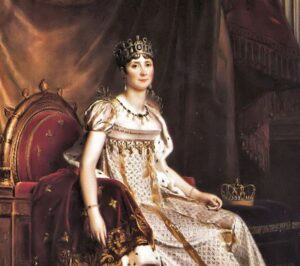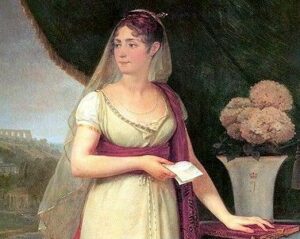A Wound that Cut Deep
The romance between Napoleon and Josephine is one of the most famous in history. When Napoleon met the older, enticing Josephine, he immediately fell head over heels. Josephine was less enamored. Though she agreed to marry Napoleon, Josephine likely (though debatably) started an affair with Hippolyte Charles, an attractive French officer, not long after the marriage took place. Napoleon, of course, was devastated.
Why would Josephine cheat on Napoleon, a man that loved her and whom she would later love back?
In this post, we will explore three reasons Josephine may have cheated on Napoleon:
- She did not love Napoleon: yet
- Affairs were somewhat normal among the French social elite
- Her first marriage left her cynical and perhaps unopen to love
For this post, we are drawing heavily on the biography The Rose of Martinique by Andrea Stuart.
Josephine Did not Love Napoleon at First
Josephine did not love Napoleon at the time of their marriage, and this likely contributed to her desire to have an affair.
The young Napoleon was six years her junior, had yet to acquire his eventual fame and power, and, even by his own admission, was a poor lover. He lacked Josephine’s social charm and found it difficult to make friends among France’s social elite. He was uncontrollably obsessed with Josephine, penning hundreds of desperate letters to her while away on campaign. For example:
“…Ah, my winsome wife, I know not what fate awaits me, but if it keeps me much longer from you it will be unbearable – my strength will not last out … the thought that my Josephine might be ill; and, above all, the cruel, the fatal thought that she might love me less, blights my soul, stops my blood, makes me wretched and dejected, without even leaving me the courage of fury and despair … to die without your love, die in uncertainty of that, is the torment of hell … My unique companion! You whom fate has destined to walk with me on the painful path of life! The day on which I no longer possess your heart will be that on which parched Nature will be for me without warmth and without vegetation. I stop, dear love! my soul is sad, my body tired, my spirit dazed, men worry me – I ought indeed to detest them; they keep me from my beloved…1
Napoleon Bonaparte
Josephine, on the other hand, was romantically the opposite of Napoleon in every way. She was older, significantly more experienced, and jaded after her first husband cheated on her constantly. She was also warm, sophisticated, and popular: she even appeared in French fashion magazines along with her friends.
In short, Napoleon was hopelessly outmatched. Even Josephine’s friends couldn’t believe that she married him.
Josephine had other reasons for marrying Napoleon, but true love was not one of them. In fact, she was so ambivalent about the marriage that she didn’t even invite her own children to the wedding. And when he went on campaign in Italy, she seemed to make every excuse not to join him. When Hippolyte Charles, who unlike Napoleon was both attractive and charming, started clamoring for Josephine’s attention, the stage was already set for an affair.
Affairs Were Common among Josephine’s Social Circle
When accusations of the affair eventually reached Napoleon, he was devastated, as anyone would expect. Among the social circles of the French elite, however, affairs were not all that uncommon. Napoleon himself immediately took a new lover, a practice he would continue off and on throughout the rest of his relationship with Josephine.
Josephine’s life was also riddled with affairs. Her first husband, Alexandre, was a philanderer and openly cheated on Josephine throughout their marriage. Josephine, in turn, became romantically involved with General Lazare Hoche while imprisoned during the French Revolution. General Hoche was married just a few days prior to being thrown in jail.
Affairs were common even amongst Josephine’s social circle. Paul Barras, Josephine’s friend and likely lover, carried on with so many mistresses while married that contemporaries derogatorily said Josephine had joined his “harem.”2
Against this backdrop, it was not shocking that Josephine entered an affair shortly after her marriage to Napoleon, a man she had not yet grown to love. As one biographer describes it, “As a vraie Parisienne, she kept her romantic and married life separate and saw taking a lover as perfectly acceptable.”3
Her First Marriage Left Josephine Cynical
At the deepest level, however, I think the misery of Josephine’s first marriage caused her to be cynical when it came to her later relationships, and she only slowly rewarmed to the idea of a heartfelt marriage.
Josephine entered her first marriage in a completely different state of mind than her first. She was an innocent 16 years old and had only just left her home in Martinque to journey to France. Her husband, Alexandre-Francois-Marie, Vicomte de Beauharnais, was a dashing nobleman who captivated Josephine from the start. In a world where her primary job as a noblewoman was to be matched with a suitable husband, Alexandre probably seemed like everything the young Josephine could have asked for.
The marriage that started so promising from Josephine’s perspective, however, quickly fell apart. Much like Napoleon would be with Josephine at the start of the relationship, Josephine was outmatched. Alexandre already had romantic experience, was educated, and socially well-connected in France. Josephine on the other hand, was in love for the first time, and felt out of place in the bustling and sophisticated world of Paris.
Alexandre did not hesitate to let her know his displeasure. He berated her constantly for not displaying the sophistication and education expected from women of his status. He spent long periods of time away from Josephine, who was already far from her home in Martinque, and cheated on her throughout the relationship.
Confused and hurt by Alexandre’s behavior, Josephine gradually withdrew from Alexandre and stopped writing to him altogether, which enraged Alexandre even more. His letters to her became downright abusive and even Alexandre’s own family and friends didn’t blame Josephine for what happened. For example:
“In spite of the despair in my heart and the fury which suffocates me, I will contain myself, I will tell you coldly, that you are in my eyes the vilest of creatures.”4
Alexandre de Beauharnais (about Josephine)
After years of turmoil and failed mediation by Alexandre’s friends and family, Josephine eventually accepted Alexandre’s plan that they separate, and she moved into a convent with their son, Eugene.
Josephine’s history with Alexandre may influenced her later behavior. Perhaps motivated by Alexandre’s criticisms, she dedicated the next years of her life to becoming the very sophisticated French woman that Alexandre had always angerly wished her to be. And after such a poor first marriage, it’s not hard to believe that she entered her second marriage, which occurred over ten years after her official separation, without any idealistic notions.
Conclusion
Whether Josephine had an affair or not, her relationship with Napoleon was never the same after the accusations surfaced. After much weeping from both parties, Napoleon stopped worshipping her, and Josephine stopped having affairs. The next few years were some of the happiest they had as a couple and, given the way Napoleon loved her children, a family. Josephine went on to play an important role in solidifying Napoleon’s rule, supporting his political ambitions and providing him with genuine personal support. Despite their reconciliation, Napoleon’s later infidelity suggests the affair, or at least speculation of one, permanently altered the way he viewed Josephine going forward.
- Napoléon I, Lettres d’amour à Joséphine, presented by Jean Tulard (Paris, 1981), pp 54-55. ↩︎
- Stuart, Andrea. The Rose of Martinique: A Life of Napoleon’s Josephine (p. 157). Grove Atlantic. Kindle Edition. ↩︎
- Stuart, Andrea. The Rose of Martinique: A Life of Napoleon’s Josephine (p. 195). Grove Atlantic. Kindle Edition. ↩︎
- Stuart, Andrea. The Rose of Martinique: A Life of Napoleon’s Josephine (p. 70). Grove Atlantic. Kindle Edition. ↩︎



